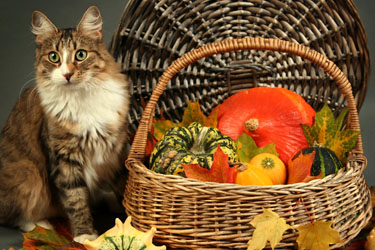Veterinarian Tips: Thanksgiving Advice for Clients

At many small animal veterinary practices, you’ll find an influx of anxious pet owners concerned about their pet’s vomiting, diarrhea, or change in behavior between U.S. Thanksgiving and the new year.
Although their actions were well-meaning, it’s likely that many of the symptoms were caused by pet owners accidentally poisoning their animals.
To prevent this, you can provide the following information to your clients:
Celebrating Thanksgiving with Your Pet
Thanksgiving poses special threats to your pet’s well-being. Food is readily available. People are rushing around. Visitors may give your pets food without checking with you. Strangers may want to interact with your pets.
Prevent Pet Poisoning
The best advice is not to change your pet’s diet at all during a holiday. How many times after Thanksgiving dinner have you suffered digestive upsets? Why would you expose your pet to such symptoms?
Changing the diet of any animal (or human) frequently results in gastric distress, including diarrhea, vomiting, and nausea. If you absolutely must include your pet in the celebration, buy it a toy.
However, if your pet is too irresistible and you know you’ll succumb to its begging, follow these 10 tips to prevent your pet —and you—from regretting its holiday feast:
- Don’t give your dog turkey skin, because it may cause pancreatitis. Symptoms of pancreatitis are vague but include lack of appetite, vomiting, weakness, abdominal pain, dehydration, and diarrhea. A small amount of turkey without the skin or bone is acceptable if you don’t mind your pet having diarrhea from eating a new food. Turkey bones splinter easily and can perforate your animal’s intestinal tract or cause choking, so keep them away from your animals.
- Spare the stuffing and any menu item that has onions, garlic, or chives, because they cause gastrointestinal upset and anemia. Symptoms of anemia may take several days to manifest and include vomiting, diarrhea, collapse, pale or bluish gums, lethargy, and fast pulse. Cats and dogs may exhibit additional and varying symptoms, too.
- Grapes and raisins can cause acute kidney failure in dogs and cats. Symptoms, such as vomiting, diarrhea, and lethargy, usually appear within 24 hours.
- Sweets are problematic. Chocolate can kill your pet, although most cats refuse to eat it. Eating chocolate can cause abnormal heart rhythm, tremors, seizures, and death. Cranberry sauce can be high in sugar. Sugar isn’t good for your pet, although it’s unlikely to directly kill it (obesity is the real problem). However, some sugar-free desserts and many sugar-free gums and candies contain xylitol, which is deadly to dogs. Xylitol also may cause your cat’s blood sugar to drop and has been implicated in liver failure. And macadamia nuts are poisonous for cats and dogs.
- Cut the casserole. Most casseroles include onions, garlic, chives or leeks, and milk and cheese. Cheese tends to cause gastrointestinal upset in both dogs and cats, so it’s not a good idea to feed it to them. As for that delicious green bean casserole you made, give your dog the green beans solo for filling, low-calorie fare.
- Milk products should be avoided. All cats and many dogs are lactose-intolerant.
- Bake the bread dough. Bread is not especially dangerous to pets unless they eat it before cooking. If that happens, expect some serious digestive upset.
- Don’t leave food out. We’ve all either experienced or know of someone whose dog or cat got hold of the Thanksgiving turkey. Even worse is if your pet eats an item whose poisonous ingredients are masked by sauces or flavoring.
- Keep the trash can tightly covered. A turkey carcass, the string used to bind the turkey, or leftovers can all be very tempting for your pet.
- Tell family and friends not to feed your pet. If necessary, post signs around your home to remind them. If your pet loves to beg for food, consider putting them in a bedroom during the celebration.
If You Believe Your Pet Has Been Poisoned
Contact your veterinarian immediately. You can also call the ASPCA Poison Control Hotline at 888-426-4435.
Keep Your Pets Safe During Thanksgiving
It’s easy to forget other dangers posed by holidays such as Thanksgiving. If the celebration is taking place in your home, consider these additional factors:
- Pet stress. Visitors, especially young children, can upset your pets. If you know they get nervous around people, put them in another room with a toy and bedding or a crate. Even the best cat or dog has its limits so if you have any question about your pet’s behavior, keep it and your visitors safe by separating them.
- Visitor safety. If any of your guests have compromised immune systems, which can be caused by pregnancy, suppressive medications/treatments, and some diseases, warn them you have a pet so they can take precautions.
- Exits. Some pets may take the opportunity to leave through an open door while you’re preoccupied with guests. Watch the exits and make sure your pet has proper identification (chip or identification tag).
- Decorations. Holiday decorations may be attractive to pets, especially cats. Never leave a pet alone with a lit candle (and unless your holiday really demands it, don’t light a candle). Pets may view small decorations as play toys, which can prove dangerous.
Sources:
https://www.avma.org/public/PetCare/Pages/thanksgiving-pet-safety.aspx
http://www.vetstreet.com/care/pancreatitis-in-dogs-and-cats
https://pets.webmd.com/cats/ss/slideshow-foods-your-cat-should-never-eat
Careers
Are you looking for a place to let your talents shine? At Covetrus, we help our practitioner customers better serve their patients and take pride in providing the best customer experience possible. Search our open positions to see our available opportunities.
Newsletter
Stay current with what’s going on with Covetrus, subscribe to receive our newsletter and email communications. Subscribers will receive the latest information in practice management, sales and marketing, animal health, and more.


Leave a comment